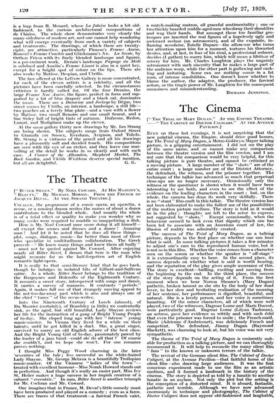The Theatre
[" BITTER SWEET." By NOEL COWARD. AT HIS MAJESTY'S. " BEAUTY." By MICHAEL MORTON. FROM THE FRENCH OF JACQUES DEVAL. AT THE STRAND THEATRE.] USUALLY, the programme of a comic opera, an operetta, a revue, or a musical drama recites the names of about a dozen contributors to the blended whole. And usually the whole is of a total effect or quality to make you wonder why so many cooks were required to muddle so unappetizing a dish.
Here is Mr. Noel Coward once more doing it all himself— all except the scenes and dresses and a dance ! Amazing man ! And let it be noted that he does all these things— plot, songs, dialogue, music—far better than most of those who specialize in multitudinous collaboration. The Greek proverb—" He knew many things and knew them all badly " —must not be quoted against Mr. Coward. After enjoying nearly all Bitter Sweet, I dream that here is the man who might recreate for us the half-forgotten art of English romantic light-opera.
It is really to that semi-literary kind that he goes back, though he indulges in isolated bits of Gilbert-and-Sullivan satire. As a whole, Bitter Sweet belongs to the tradition of the Burgoynes and Holcrofts of the Eighteenth Century. It recounts a sweet story, intersperSed with songs and dance. It carries a survey of manners. It contrasts " periods." Again, it makes full use of that strangely moving appeal to the not-too-far-away past which is also and always one of the chief " turns " of the revue-writer.
Into the Nineteenth Century of Leech (almost), of Du Maurier (certainly), of Beardsley (a little) we contentedly sink, as the aged, but still beautiful, Lady Shayne reviews her life for the instruction of a gang of Bright Young People of to-day. She eloped long ago with her " intense young music-master. In Vienna they lived for a while on their talents, until he got killed in a duel. She, a great singer, • survived to marry an old English adorer of the best class. And the Bright Young Girl of to-day, passionately pawed by the leader of a jazz band—could she do all that ? Of course she couldn't, and we hope she won't. For one romance proves nothing.
I thought Miss Peggy Wood charming in the later 'seventies of the tale ; less successful as the white-haired Lady Shayne. Mr. George Metaxa is a beautifully Trollopian music-master. Of the Viennese " ladies of the town "- treated with excellent humour—Miss Norah Howard stands out in perfection. And though it's really an easier part, Miss Ivy St. Helier makes a huge success in her impish creation of a cabaret " eccentric." In sum, Bitter Sweet is another triumph for Mr. Cochran and Mr. Coward.
One imagines that in France, M. Deval's little comedy must have been produced and played as a comedy.; even as a farce. There are traces of that treatment—a farcical French valet,
a match-making matron, all graceful sentimentality ; one-or two thickly bearded middle-aged men who shrug their shoulders and wag their hands. But amongst these too familiar grow tesques are inserted the real figures of a hopelessly ugly and awkward recluse (an astronomer), and of the exquisite, in flaming mondaine, Estelle Dupare—the allumeuse who turns her attention upon him for a moment, tortures his thwarted desires, and, at last, in fear of his rival, a professional seducer, decides (I gather) to marry him, which will mean a lifetime of misery for him. Mr. Charles Laughtoh _plays the ungainly astronomer with such sincerity that he makes a large part of the audience weep, while the other part is guffawing and cack- ling and irritating. Some can see nothing comic in a fat man, of intense sensibilities. One doesn't know whether to blame the author, the adaptor, the producer, the farcical actors, or the tragic power of Mr. Laughtim for the bon4equent uneasiness and misunderstanding:
RICHARD JENNINGS..


































 Previous page
Previous page